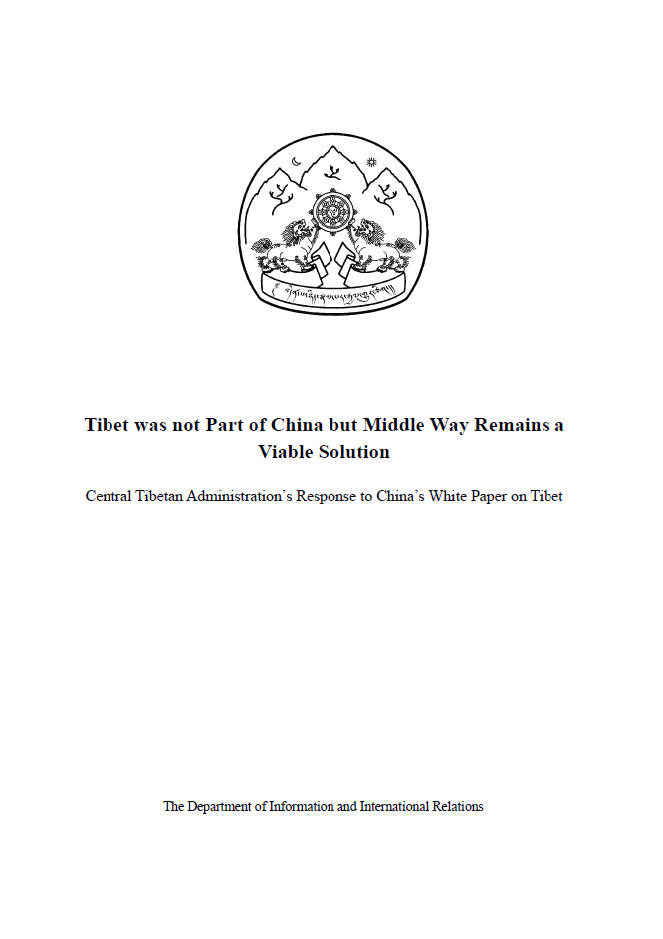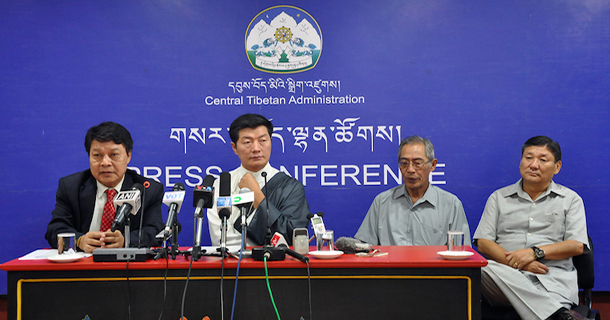The Central Tibetan Administration (CTA) has challenged China’s latest White Paper on Tibet which claims that the legitimacy of the His Holiness the Dalai Lama depends on China’s recognition and approval.
The CTA’s response entitled “Tibet was not part of China but the Middle Way remains a viable solution” was presented by the Department of Information and International Relations at a press conference on September 1.
As well as challenging China’s claim about the legitimacy of the His Holiness’s reincarnation, the response also provides a comprehensive explanation that China’s allegations about their role in the reincarnation claims not only territorial dominance but also dominance over the soul of the Tibetan people.
 The CTA’spaper also argues that the Middle Way Approach (MWA) is the way to resolve the issue. Despite China’s repeated rejection of MWA, the CTA says that Chinese leaders should look closely at the proposal which seeks autonomy for all Tibetans under a single administration, preserving the territorial integrity of the People’s Republic of China. The response confirmed that an increasing number of Chinese intellectuals within and outside China, including Nobel Peace Laureate Liu Xiaobo, support this initiative.
The CTA’spaper also argues that the Middle Way Approach (MWA) is the way to resolve the issue. Despite China’s repeated rejection of MWA, the CTA says that Chinese leaders should look closely at the proposal which seeks autonomy for all Tibetans under a single administration, preserving the territorial integrity of the People’s Republic of China. The response confirmed that an increasing number of Chinese intellectuals within and outside China, including Nobel Peace Laureate Liu Xiaobo, support this initiative.
It also says that recognising the aspirations of Tibetan people can greatly pave ways to enhance China’s soft power around the world in the making of global leadership.

Sikyong, Lobsang Sangay with Thubten Samphel, Director of Tibet Policy Institute and the Secretaries of DIIR at the Press Conference
Photo: tibet.net
Sikyong, or Prime Minister, Lobsang Sangay said at the press conference that it is an historically proven fact that Tibet was a free country and the legitimacy or authority to decide about the reincarnation of His Holiness the Dalai Lama lies solely with Dalai Lama himself and not anyone else.
The issue of Tibet is in the Chinese public eye at present. From September 1, Beijing commemorates the 50th anniversary of the establishment of the Tibet Autonomous Region (TAR). Earlier, on August 24-25, a meeting of the sixth Tibet Work Forum was held in Beijing with Chinese President Xi Jinping presiding over top Chinese leaders. This meeting reinforced China’s uncompromising stance regarding the Middle Way Approach. President Xi Jinping said, “Key efforts in the work for Tibet should be spent on ensuring national unity and consolidating ethnic unity, with realising long-term and comprehensive social stability as an obligatory task.”
As reported on Tibet.net, the groundwork for these issues was initiated by the White Paper on Tibet which China published on April 15 this year. This White Paper focused on economic development in Tibet, and denouncement of the Middle Way as advocated by His Holiness the 14th Dalai Lama.




 Print
Print Email
Email